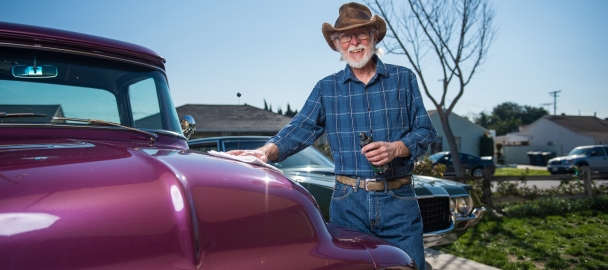
Air Force veteran, David Griffin, 74, spends his days doing the things he loves, line dancing and restoring hot rods with his son. David was generally in good health, but in late 2015, he began experiencing frequent stomach pains. One day, the pain felt different, and David knew he needed to see a doctor.
“I trust my family doctor, Robert Comer, M.D., implicitly, and he has always insisted ‘get yourself to Long Beach Medical Center no matter what it takes if you have emergency’. Right away when I felt like I was getting the flu, my son drove me to the Emergency Department at Long Beach Medical Center,” says David. “Things moved quickly from there.”
A CT scan showed an enlarged colon and a possible mass in the colon. As a result of the CT scan, David was seen by a gastroenterologist, Barry Zamost, M.D., for a colonoscopy.
Dr. Zamost discovered a large mass and an intestinal blockage (obstruction) that was keeping food and stool contents from passing through David’s intestine and colon. A biopsy confirmed that the mass was colon cancer.
When it comes to restoring hot rods, David is king, but he needed an expert to conquer cancer. At the MemorialCare Todd Cancer Institute at Long Beach Medical Center, instead of one expert, David found a team of specialists prepared and ready to restore him back to health.
Paging the Experts
David would first need surgery to treat his cancer, so he needed the guidance of an expert surgeon, Steven Grant, M.D.
Just days after his colonoscopy, David underwent a resection – a procedure to remove part of his affected colon. The surgery left David’s colon weak, so he spent almost a month in the hospital.
During that time, David underwent a temporary colostomy, which is a procedure where the healthy end of the large intestine is brought out through an opening made in the abdominal wall. Stools moving through the intestine drain through the stoma into a temporary bag attached to the outside of the abdomen. This is done when the lower large intestine is unable to function normally or needs rest; David eventually had his colostomy reversed when his body was ready.
Growing the Team
In the meantime, David began several months of chemotherapy treatments. Chemotherapy works by preventing cancerous cells from duplicating. Nilesh Vora, M.D. was David’s oncologist and was essential in providing treatment and guidance for the cancer.
To monitor the progress of the cancer, Dr. Vora continued to recommend positron emission tomography (PET) scans to check on David’s progress.
“Cancer cells show up as bright spots of PET scans, allowing us to determine whether the chemotherapy is working, if the cancer has spread, or the cancer has recurred,” says Dr. Vora.
On one of David’s PET scans, Dr. Vora noticed some abnormalities near the site of David’s surgery and on his liver.
Luckily for David, Long Beach Medical Center is one of the only hospitals in the region, and the only hospital in Long Beach, to offer advanced and interventional endoscopy. The use of this advanced technology allows physicians to diagnose, stage and remove early cancers - often during just one procedure.
David’s specialist team grew even larger with the addition of Bhavesh Shah, M.D., who serves as the Medical Director of Interventional Gastroenterology at Long Beach Medical Center and the Gastroenterology Director at the MemorialCare Todd Cancer Institute. Dr. Shah performed a colonoscopy in addition to an endoscopic ultrasound (EUS). EUS was used to examine the area of the previous surgery in more detail utilizing a specialized scope with an ultrasound probe.
“Without this technology, David would have required another surgery to view the colon in clear detail,” says Dr. Shah. “Instead, I was able to perform the procedure in a minimally invasive fashion, saving David from another surgery and another lengthy recovery.”
The procedure uncovered recurrences of David’s cancer.
“Based on his markers, David continued chemotherapy and has responded well to his current treatments,” says Dr. Vora. “If we continue to maintain progress, the next step will be maintenance chemotherapy to help prevent future recurrences.”
Today, backed by his team, David continues to live out his passions.
“The way I see it, is not that I have a history with cancer – I just had a brief encounter with cancer,” says David. “I’m not going to be on a first name basis with this disease. That’s the best thing I can do to beat it.”